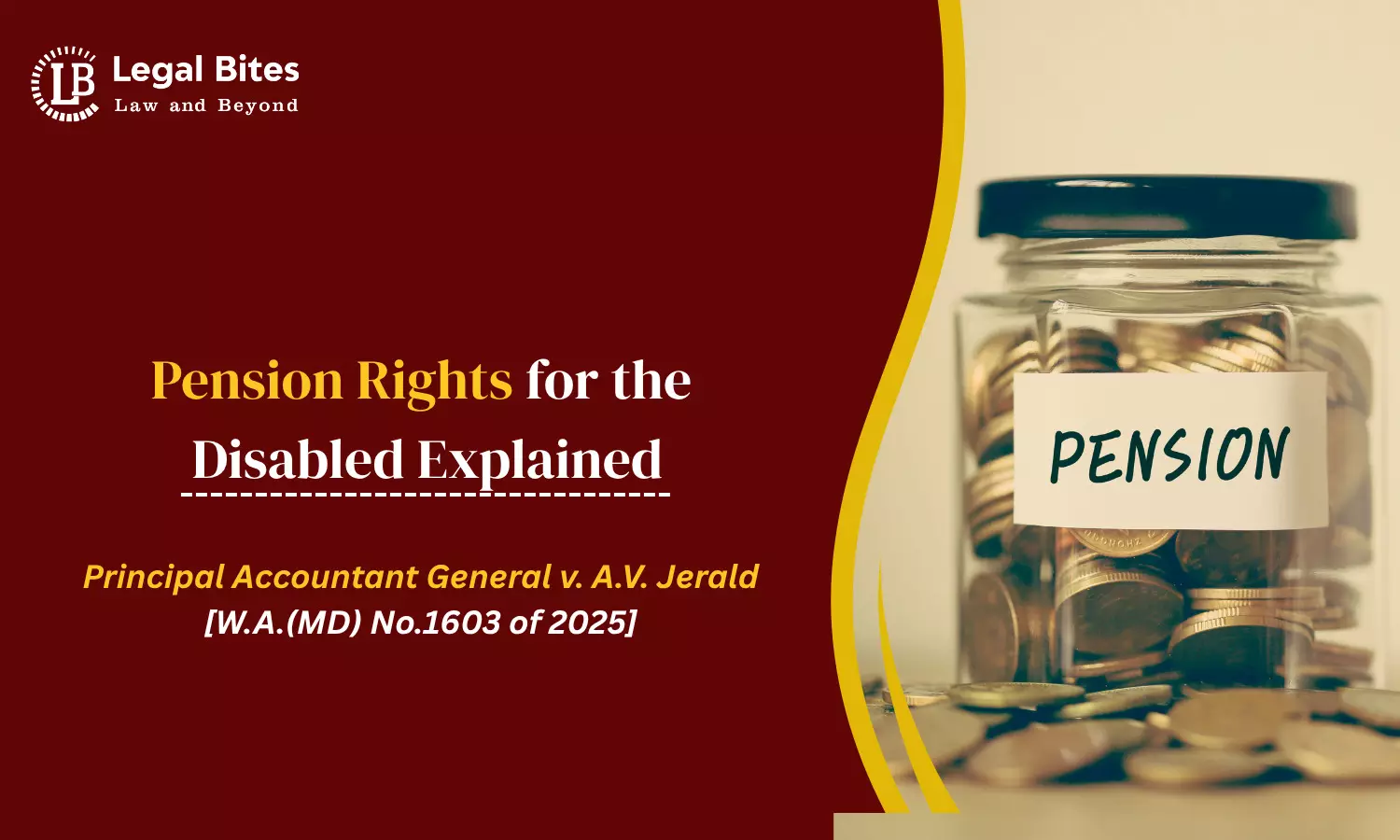Is Pension a Right or a Charity for Disabled Dependents?
Scroll down to find out whether pension for disabled dependents of government employees is a statutory right or a charitable, discretionary benefit.

Pension is often seen as a financial lifeline for retired employees and their families. But when it comes to disabled dependents—especially mentally or physically challenged children of government employees—questions frequently arise: Is pension an act of benevolence by the state or an enforceable legal right? A landmark judgment by the Madras High Court in Principal Accountant General v. A.V. Jerald (W.A.(MD) No.1603 of 2025) has provided much-needed clarity, reinforcing that pension for disabled dependents is a matter of right, not charity.
This article examines the legal framework, constitutional values, and judicial interpretation that affirm the entitlement of disabled dependents to family pension under Indian law.
Understanding Pension: A Legal Right, Not Bounty
The Supreme Court has repeatedly affirmed that pension is not a gift but a deferred part of the compensation for services rendered by the employee. In D.S. Nakara v. Union of India, AIR 1983 SC 130, the Apex Court observed that pension “is not a bounty payable on the sweet will of the employer.”
This foundational principle extends to family pension, which ensures continued livelihood for the dependents of deceased government employees. Importantly, under both Central and State Pension Rules, mentally or physically disabled children are entitled to this support.
Statutory Provisions Governing Disabled Dependents' Pension
1. Central Civil Services (Pension) Rules, 1972
Rule 54(6) clearly states:
If the son or daughter of a government servant is suffering from any disorder or disability of mind (including mental retardation), so as to render them unable to earn a living even after attaining the age of 25 years, the family pension shall be payable for life.
The only requirement: A medical certificate from a competent authority attesting to the nature and extent of the disability.
2. Tamil Nadu Pension Rules, 1978
Mirroring the CCS Rules, Rule 49(6) provides:
A disabled child, irrespective of age, shall receive pension for life, provided a medical officer not below the rank of a civil surgeon certifies their inability to earn a livelihood.
Notably, neither of these provisions require an income certificate, yet departments often impose this arbitrary condition, denying pension on technicalities.
Case Analysis: Principal Accountant General v. A.V. Jerald (2025)
Factual Background
- A.V. Jerald, the mentally disabled son of deceased forester A. Varuvel, was denied pension after both his parents passed away.
- His elder brother, A.V. Tharsius, made multiple representations on his behalf, all of which were ignored.
- A writ petition was finally filed and allowed by the Madurai Bench of the Madras High Court on 10.02.2025.
Observations of the Court
- The Court lambasted the authorities for their insistence on an income certificate, which was not required by the pension rules.
- Emphasising the benevolent intent behind Rule 54(6) CCS and Rule 49(6) TN Rules, the Bench asserted that pension is not a form of charity or benevolence granted at the discretion of the state. Instead, it is a rightful entitlement earned through years of service. Denying it, especially to disabled dependents, undermines the very principles of justice and welfare the law seeks to uphold.
- The judges invoked Article 21 of the Constitution, stating that denying pension to mentally disabled dependents infringes on the right to life and dignity.
Directive Issued
- Pension must be disbursed upon submission of a valid medical certificate.
- No requirement for proof of income.
- Authorities were warned against unnecessary delays or documentation hurdles.
Judicial Precedents Reinforcing This View
Bhagwanti Mamtani v. Union of India, 1995 Supp (1) SCC 145
- The daughter of a deceased employee was granted family pension based on a medical report from AIIMS, despite procedural delays and the fact that the pension rules came into effect after her father’s death.
- The Supreme Court prioritised substantive justice over technical hurdles.
D.S. Nakara v. Union of India, AIR 1983 SC 130
- Defined pension as a social welfare measure linked to Article 14 (Equality) and Article 21 (Life and Dignity).
Union of India v. Devaki Nandan Aggarwal, AIR 1992 SC 96
- Held that pension rights cannot be arbitrarily taken away or modified.
Constitutional and Ethical Dimensions
Article 21 – Right to Life and Dignity
The denial of family pension to mentally or physically disabled dependents amounts to a denial of basic dignity and financial security, violating Article 21.
Article 41 – Right to Assistance
Directive Principles under Article 41 impose a duty on the state to provide public assistance in cases of disablement and old age.
United Nations Convention on the Rights of Persons with Disabilities (UNCRPD)
India, being a signatory, is obligated to promote social security and support systems for disabled persons. Denying pension to them is against the spirit of the Convention.
Highlights of the Judgment
The Bench comprising Justice G.R. Swaminathan and Justice K. Rajasekar observed:
"Pension has always been characterised as a matter of right and not charity or bounty. When it comes to extending the benefit for the mentally disabled, the authority must exhibit alacrity. Such an approach alone would subserve and effectuate the benevolent object with which the statutory rules have been formulated. They should be seen as one more facet of Article 21 of the Constitution of India.
We hold that the son/daughter of a pensioner who is mentally disabled and who falls within the scope of the pension rules should be disbursed with family pension on submission of the medical certificate evidencing his/her incapacity to earn livelihood on their own without insisting on certificate denoting income from all sources. The sanction order must be passed without any delay after the documents mentioned in the statutory rules are submitted."
Real-Life Relevance and Continuing Challenges
Despite clear legal provisions and multiple judgments, authorities continue to:
- Demand unnecessary documents like income certificates.
- Delay disbursement through bureaucratic red tape.
- Ignore judicial precedents, requiring fresh litigation.
The A.V. Jerald case highlights systemic apathy, where only judicial intervention leads to relief.
Recommendations for Reform
- Clear Administrative Guidelines: Departments must be issued strict instructions reiterating that medical certification alone is sufficient.
- Time-Bound Processing: A fixed timeline (e.g., 60 days) for processing such pension applications must be mandated.
- Accountability Mechanism: Officers delaying or obstructing rightful claims must be held accountable under service rules.
- Public Awareness: Families should be informed of their rights under pension schemes for disabled dependents.
- Digital Monitoring System: A central dashboard tracking all family pension claims for disabled dependents can reduce delays.
Conclusion
The judgment in Principal Accountant General v. A.V. Jerald is a beacon of hope and clarity. It affirms what the law, logic, and humanity demand: that pension for disabled dependents is a rightful entitlement, not a benevolent charity. Governments and departments must shift from a mindset of suspicion and procedural rigidity to one of empathy, justice, and constitutional duty. The Court emphasised that government departments and pension-disbursing authorities must act promptly and proactively when dealing with pension claims involving disabled dependents.
Ensuring timely pension for disabled dependents is not just a legal obligation—it's a moral imperative.
Important Link
Law Library: Notes and Study Material for LLB, LLM, Judiciary, and Entrance Exams

